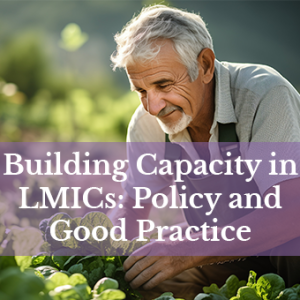Presenter(s):
Michael Kalu; Blessing Ojembe; Olayinka Akinrolie; Augustine Okoh; Ogochukwu Onyeso;, York University/Emerging Researchers & Professionals in Ageing – African Network, Canada
Abstract
Background
The Emerging Researchers and Professionals in Ageing African Network (ERPAAN) – https://erpaan.org, is a virtual network dedicated to researchers and professionals engaged in the field of aging within the Sub-Saharan African region. With over 80 members spanning various continents—including North America, Europe, the Pacific, Africa, and Asia—our network embodies transdisciplinary expertise in diverse domains such as physical, social, environmental, mental, and financial health. Our members come from a wide range of professional backgrounds, including health, social sciences, engineering, arts, and pure sciences. Our vision is to build capacity for research and care for older adults in anticipation of the projected increase in the aging population in Sub-Saharan Africa (SSA).
Objective
This presentation aims to highlight the network’s research activities and potential capacity-building strategies. We will discuss four interrelated projects designed to establish aging research and practice priorities through various approaches. First, we conducted a systematic review that achieved several objectives: (a) it reported on the types and trends of aging research in SSA, providing specific recommendations for future studies; (b) it assessed the reporting quality of various types of aging research in the region; (c) it described longitudinal studies on aging in Africa, highlighting their impact on the continent; and (d) it identified a decade’s worth of aging research opportunities, challenges, and solutions, prioritizing critical areas and methodologies relevant to SSA.
Findings
Our findings revealed significant insights: we identified 512 studies—comprising 426 quantitative, 71 qualitative, and 15 mixed-methods studies—conducted across 32 countries and covering 30 subject areas. Notable topics included noncommunicable diseases (n=41), HIV/AIDS (n=30), cancer (n=28), physical functioning (n=26), quality of life (n=22), and dementia or cognitive impairment (n=20), along with healthcare utilization studies (n=20). However, there was a noticeable scarcity of studies addressing social and environmental factors. In terms of quality, while 20.4% of the articles were categorized as high quality, 53.7%, 17.7%, and 8.2% were rated as moderate, fair, or poor quality, respectively. Additionally, 193 studies utilized 24 longitudinal datasets from 28 unique sites, with a predominance of cross-sectional analytical approaches.
Next Steps: Our current project, which is in the recruitment phase, aims to further explore a decade’s worth of aging research opportunities, challenges, and solutions while prioritizing essential research areas and methodologies pertinent to SSA.
Other activities for capacity building
In addition to our research initiatives, we are committed to various capacity-building activities, including: (a) providing scholarships for undergraduate students in Sub-Saharan Africa who are conducting community-informed or driven projects on aging as part of their degree requirements; (b) funding opportunities for these students to attend relevant conferences; and (c) offering training in gerontological care and research methodologies.
Conclusion
We urge funding bodies like WHO-SAGE to create funding competitions for longitudinal analyses, such as structural equation modeling, that would highlight changes occurring as a result of the aging population in SSA. The ERPAAN network is well-positioned to provide evidence for policy development, an area in which we are actively seeking opportunities to contribute. Through our collaborative efforts and research initiatives, we aim to make a meaningful impact on the well-being of older populations in sub-Saharan Africa.
Bio(s):
Dr. Michael Kalu is an Assistant Professor of Rehabilitation Therapy in Clinical Treatment & Clinical Care at York University’s School of Kinesiology and Health Science. Moreover, his interdisciplinary expertise stems from a diverse academic and professional background, including training as a physiotherapist (Bachelor of Medical Rehabilitation – Physiotherapy, University of Nigeria), social gerontologist (MSc in Gerontology, University of Southampton), and rehabilitation scientist (MSc in Rehabilitation Science, Queen’s University & PhD in Rehabilitation Science, McMaster University). In addition, he expanded his research expertise as a postdoctoral fellow at Dalhousie University. Dr. Kalu serves as the Scientific Director of the Emerging Researchers & Professionals in Ageing – African Network, contributing to impactful aging research in Sub-Saharan Africa. His work is particularly focused on improving the health and mobility of older adults through innovative, culturally adapted approaches.

